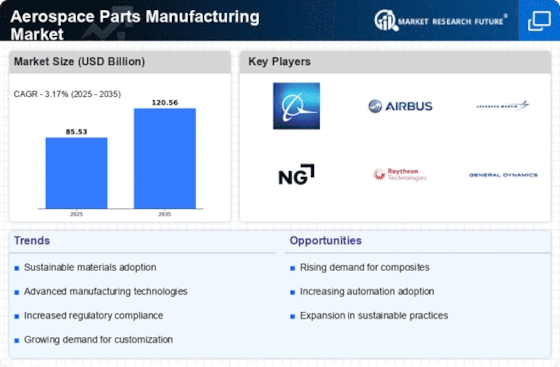Top Industry Leaders in the Aerospace Parts Manufacturing Market

Strategies Adopted:
- Vertical Integration: Many key players engage in vertical integration by acquiring or establishing subsidiaries involved in various stages of the aerospace parts manufacturing process, from raw material production to component assembly, to ensure supply chain control and cost efficiency.
- Technological Innovation: Companies focus on continuous technological innovation to develop lightweight, high-performance parts using advanced materials and manufacturing processes, meeting aerospace industry demands for improved fuel efficiency, performance, and safety.
- Strategic Partnerships: Strategic partnerships and collaborations with OEMs, suppliers, research institutions, and government agencies enable companies to share expertise, resources, and risks, enhancing their competitiveness and market presence.
- Global Expansion: Expansion into emerging markets, establishing manufacturing facilities, joint ventures, and sales offices in strategic locations worldwide, helps companies capitalize on growing aerospace demand, access new customer segments, and mitigate geopolitical risks.
Key Companies in the aerospace parts manufacturing market include.
JAMCO Corporation
Intrex Aerospace
Rolls Royce PLC
CAMARA Aircraft Parts Company
Safran Group
Brunswick Corporation
Factors for Market Share Analysis:
- Quality and Reliability: Quality and reliability of aerospace parts play a crucial role in market share analysis, with OEMs and airlines prioritizing suppliers with proven track records of delivering high-quality, reliable components that meet stringent industry standards and regulatory requirements.
- Cost Competitiveness: Cost competitiveness, achieved through efficient production processes, economies of scale, and supply chain optimization, influences market share, with customers seeking suppliers offering competitive pricing without compromising on quality.
- Technology Leadership: Companies investing in research and development (R&D) to develop cutting-edge technologies and innovative solutions gain a competitive edge, attracting customers seeking advanced aerospace parts with superior performance, durability, and efficiency.
- Customer Relationships: Building strong, long-term relationships with OEMs, airlines, and other aerospace industry stakeholders, providing exceptional customer service, technical support, and aftermarket services, enhances market share and customer loyalty.
Industry News:
- OEM Contracts and Orders: News regarding OEM contracts, orders, and production ramp-ups provide insights into market dynamics and competitive positioning, with companies securing major contracts gaining market share and industry recognition.
- Technological Advancements: Reports on technological advancements, such as additive manufacturing, composites, and smart materials, highlight innovation trends shaping the aerospace parts manufacturing market and driving competitive differentiation.
- Regulatory Updates: Updates to aerospace industry regulations, standards, and certifications impact market dynamics, with companies investing in compliance initiatives to maintain market access and competitiveness.
- Supply Chain Disruptions: News of supply chain disruptions, material shortages, and production delays affect market dynamics, with companies implementing contingency plans and supply chain resilience strategies to mitigate risks and maintain customer satisfaction.
Current Company Investment Trends:
- Digitalization and Industry 4.0: Investments in digitalization technologies, including automation, robotics, artificial intelligence, and digital twins, enhance operational efficiency, product quality, and supply chain visibility, driving competitive advantage.
- Sustainability and Environmental Responsibility: Companies are investing in sustainable manufacturing practices, eco-friendly materials, and renewable energy sources to reduce carbon emissions, minimize environmental impact, and meet customer demand for greener aerospace solutions.
- Talent Development and Training: Investments in talent development programs, employee training, and skill enhancement initiatives ensure a skilled workforce capable of meeting evolving market demands and technological challenges, enhancing companies' competitiveness.
- Mergers and Acquisitions: Mergers, acquisitions, and strategic alliances enable companies to consolidate market share, expand product portfolios, and access new technologies and markets, driving growth and competitiveness in the aerospace parts manufacturing market.
Aerospace Parts Manufacturing Industry
Developments
For Instance May 2021
Kencoa Aerospace Corporation, aerospace and defense manufacturing and materials company, has partnered with SyncFab, the first Manufacturing Blockchain and Supply Chain Blockchain solution for parts suppliers and buyers, to deliver digital transformation convenience and efficiencies to shared industry-leading clients in space, aerospace and defense industries.
For Instance March 2020
Kymera International has completed its transaction with Ametek, Inc., based in Pennsylvania in the United States. It has announced the acquisition of 100% shares of the Reading Alloys business, which includes the development and production of master alloys, thermal barrier coatings, and titanium powders that are used in the aircraft industry, which in turn expanded the company’s business and its product portfolio.
For Instance July 2019
Kordsa Teknik Tekstil A.S. announced the acquisition of Axiom Materials. This aerospace composite manufacturer enhances its business in the advanced composite materials industry and strengthens its product portfolio.











